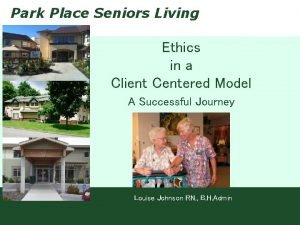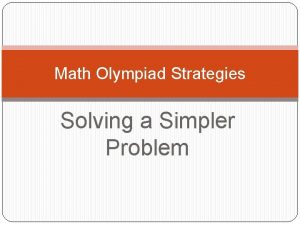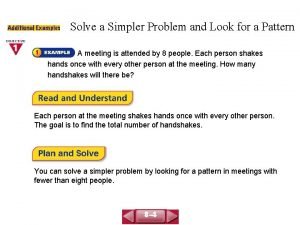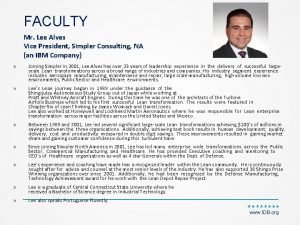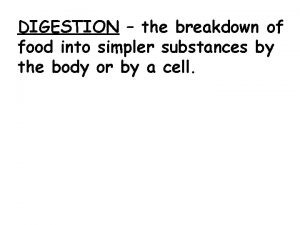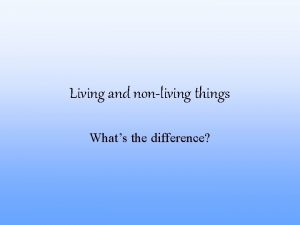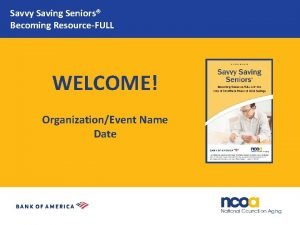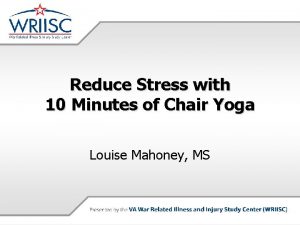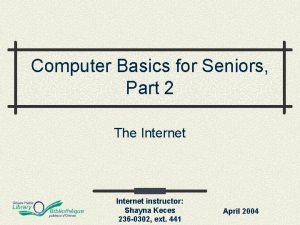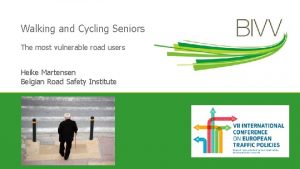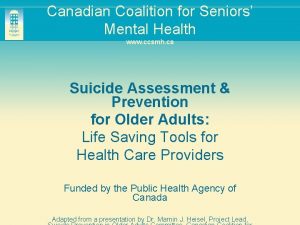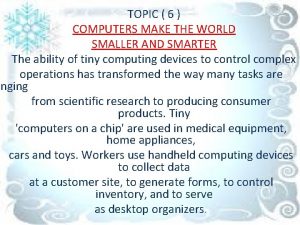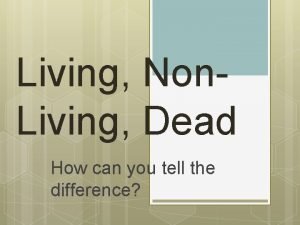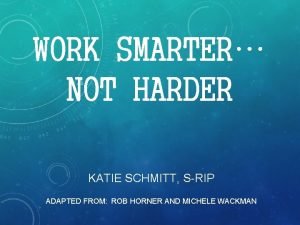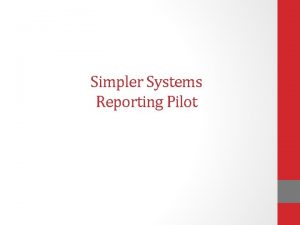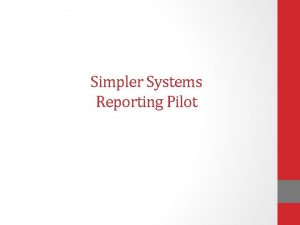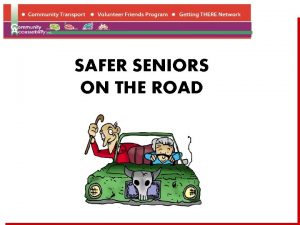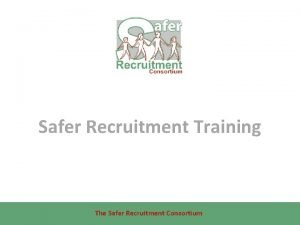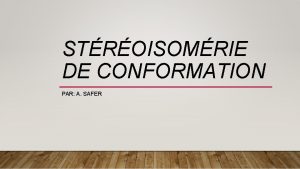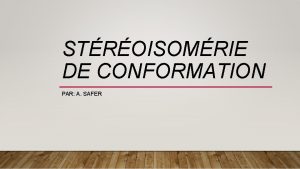Welcome Seniors Living Safer Simpler and Smarter Lives






























- Slides: 30

Welcome!

Seniors Living Safer, Simpler, and Smarter Lives An Occupational Therapy perspective on the challenges facing the senior population, with some of the strategies and equipment that can help you to overcome those challenges.

Seniors Living Safer Safety is a greater concern as we age, because your body cannot tolerate and recover from injury as well as it did when you were younger. The strategies to safer living can be implemented in all aspects of daily living. Safety can be achieved in the home, community, or during travel. We will cover safety issues such as: decreased vision, fall risks/precautions, driving safely, and general safety.

Seniors Living Simpler Who says that getting old has to be hard? There are ways to make your life activities more simple, so that you can spend more time enjoying them, and less time preparing or recovering from them. We will cover techniques for work/activity simplification Organization, preparation, delegation of tasks, and use of adaptive technology all help to simplify tasks.

Seniors Living Smarter Using your brain to help your body will conserve energy and make activities more enjoyable. Know your limits, and respect pain and fatigue. Think ahead before doing any activity: An ounce of prevention is worth a pound of cure. When available, use a device to help you. Set priorities. Do the things that have to be done today, and save those things that can wait until another time.

Seniors Living Smarter Keep good posture! Choose straight firm chairs that support your lower back. Sit whenever possible. Avoid leaning over, locking your knees, and twisting your back. Work in good conditions: appropriate lighting, good ventilation, suitable noise level. Choose easy to handle appliances such as lightweight dishes and utensils with large, non-skid handles that provide a good grip. Get items with long handles or wheels such as. long-handled dusters and tongs.


Who Benefits from this? For energy conservation and work simplification: people with arthritis, chronic pain, chronic fatigue, MS, congestive heart conditions, COPD, or anyone who fatigues easily. For safety: EVERYONE benefits from a safer environment. No one is completely safe from accidents.

Safety

Things to think about Proper lighting High Contrasted floors and rugs are helpful through out house Removing any tripping hazards in areas with frequent foot traffic De-clutter area Guide rails mounted on steps (if any in house or bathrooms)

Problems and their Possible Solutions Difficulty getting in and out of the shower? Install grab bars, shower seats or transfer benches!

Problems and Their Possible Solutions Slipping on the inside and outside of the tub/shower? Place non-skid strips or decals in the tub or shower Place a shower rug outside of the tub/shower

Problems and Their Possible Solutions Difficulty with access to home Install ramps

Problems and Their Solutions Problems climbing stairs Install hand rails for support!

Smarter Seniors Examples

Work Simplification: Definition Work simplification makes tasks easier by reducing strain and conserving energy. To simplify work, use adaptive equipment to save energy and decrease muscle use/strain. Work simplification can help people with chronic conditions lead more independent and rewarding lives.

Work Simplification: Organization Organize your work areas such as the kitchen or bathroom to so that everything is within reach. Setting a routine will make you more proficient at tasks or activities, and will then save you time and energy. Alternate heavy tasks with lighter tasks. Take breaks BEFORE you get tired! Look at the tasks you do and break them up into smaller steps. Can any of these steps be removed? Store heavy or frequently used items at waist height.

Organization

Work Simplification: Bathing Use of a shower stool will help to keep you safer in the shower while also conserving energy. Take warm showers NOT hot showers when preparing to do tasks. Hot showers cause more energy expenditure. Take shorter showers in the morning and save longer showers for before bedtime. Use a terry cloth bathrobe after showering to soak up water and decrease the amount of drying necessary. Use adaptive equipment such as sponge sticks to wash your back.

Examples of Bathing Simplification

Work Simplification: Grooming Use an electric toothbrush instead of a manual to save energy. Do your grooming while seated. Just like in the shower, this will keep you safer and save energy. Have your clothes set out and close to your grooming area/seat to limit unnecessary movement. Get in a routine for your grooming habits and follow it daily. This will make you more efficient in this task. Use adaptive equipment such as: dressing sticks, long handled shoe horns, and reachers to assist you.

Just a few examples of adaptive equipment for grooming/dressing

Work Simplification: Meal preparation Serve foods in the same containers in which they are prepared. Cook double portions and save the remaining food for another meal. Use devices such as: microwaves, electric can openers, automatic chopping/dicing devices, and dishwashers. Organize your kitchen so everything is within reach. Plan meals that are easy to prepare and clean up.

Meal Prep Ideas

Work Simplification: Planning To start make a list, rank them in order of importance by asking yourself: 1. What do I enjoy doing? What is important to me? 2. What absolutely has to be done today? 3. Do I have to do everything myself? 4. How often does this task need to be done? 5. Are my expectations of myself realistic?

Work Simplification: Planning Try to create a daily and weekly schedule. Separate harder tasks to different days. Don't do too many tasks in one day. Break up your routine with leisure activities and rest breaks. Plan breaks into your tasks. Plan on resting ahead of time, and remember that it is better to take shorter, more frequent rest breaks. Plan to do activities/tasks when your energy levels are highest and pain is lowest. Example: Early morning after pain medications have started to give relief. Never rush to complete a task. Allow ample time.

Work Simplification: Planning Put everything you use for a particular activity in one place e. g. Before sitting down to watch TV, gather everything you’ll need – phone, glasses, remote control – and then take it easy! Respect your personal rhythm, recognize the times of day when you feel energetic and take this into account when you schedule your activities. Schedule your activities for the week and then plan your days, maintain a balance among them.

An ounce of prevention…

Don’t forget to take breaks!

Seniors are…
 Integrated ethics model
Integrated ethics model Welcome back seniors
Welcome back seniors Solve a simpler problem strategy
Solve a simpler problem strategy Solve a simpler problem examples
Solve a simpler problem examples Simpler consulting
Simpler consulting Breakdown of food
Breakdown of food Vowel distortions
Vowel distortions Venn diagram living and non living
Venn diagram living and non living Savvy saving seniors
Savvy saving seniors Identification of seniors at risk
Identification of seniors at risk Dutchtown high school seniors
Dutchtown high school seniors Cbhs seniors
Cbhs seniors 10 minute chair yoga for seniors
10 minute chair yoga for seniors Momiji retirement home
Momiji retirement home Pps humour seniors
Pps humour seniors Internet basics for seniors
Internet basics for seniors Cycling seniors
Cycling seniors Writing prompts for seniors
Writing prompts for seniors Food safety for seniors
Food safety for seniors Ccsmh
Ccsmh Computers make the world smaller and smarter
Computers make the world smaller and smarter Computers make the world smaller and smarter
Computers make the world smaller and smarter Smarterbalanced.alohahsap.org
Smarterbalanced.alohahsap.org Is moss living or non-living
Is moss living or non-living Living non living dead
Living non living dead What is the smallest living unit in all organisms?
What is the smallest living unit in all organisms? Wise men three clever are we
Wise men three clever are we Working smarter matrix
Working smarter matrix Smarter vision
Smarter vision Smarter charts
Smarter charts Smarter 2030
Smarter 2030
